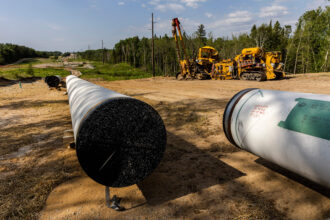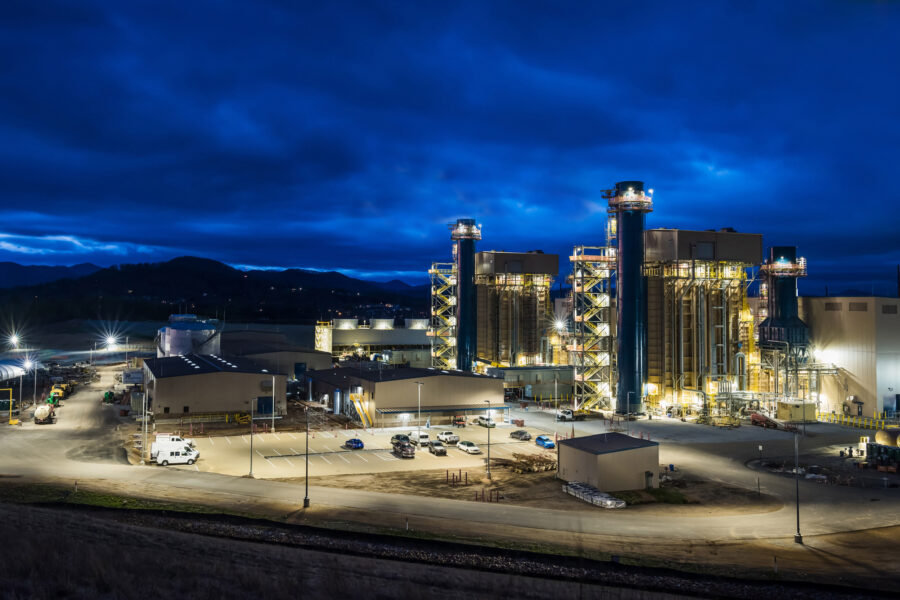Michigan Attorney General Bill Schuette called for a deadline to close a controversial portion of an oil pipeline that runs along the bottom of the Straits of Mackinac, a channel that connects two of the Great Lakes. The pipeline has had more than two dozen leaks over its lifespan, and parts of its outer coating have come off.
The announcement came as the state released a report looking at alternatives for that section of the Enbridge pipeline, called Line 5.
The report’s suggestions include drilling a tunnel under the straits for a new line, selecting an alternate route or using rail cars to transport the oil instead. It also left open the possibility that the existing pipeline could continue to operate indefinitely.
“The Attorney General strongly disagrees” with allowing the existing pipeline to continue operating, said a statement released by Schuette’s office on Thursday. “A specific and definite timetable to close Line 5 under the straits should be established.”
Schuette did not, however, specify when that deadline should be, or how it should be set.
For years, environmentalists and a local Indian tribe have been calling for the closure of this short stretch of the pipeline. Built in 1953, it sits exposed above the lakebed where Lake Huron meets Lake Michigan. Earlier this year, Enbridge acknowledged that an outer coating had fallen off of the line in places, and it has sprung at least 29 leaks in its 64-year history. The 645-mile line carries about 540,000 barrels per day of light crude, including synthetic crude from Canada’s tar sands, as well as natural gas liquids, from Superior, Wisconsin, to Sarnia, Ontario.
Schuette, a Republican, had said before that this section of the line should close eventually, but he hasn’t taken any action to hasten a closure. Advocacy groups have asked the state to revoke Enbridge’s easement to pass through the straits.
“It’s great that he’s reasserting his commitment to shut down Line 5,” said Mike Shriberg, Great Lakes executive director for the National Wildlife Federation. “The question now is, is there enough evidence for him to take action right away.”
The state had commissioned two studies on the line to be paid for by Enbridge, one that was released yesterday and another that was to produce a risk analysis for the pipeline. Last week, however, the state cancelled the risk analysis after discovering that someone who had contributed to it had subsequently done work for Enbridge.
Michael Barnes, an Enbridge spokesman, said the company would need time to review the report before giving specific comments, but that it “remains committed to protecting the Great Lakes and meeting the energy needs of Michigan through the safe operation of Line 5.”
Shriberg said that now that the report on alternatives is out, it’s time for the state to act.
“Ultimately, the attorney general and the governor have a decision to make,” he said. “They’ve been saying for years that they’ve been waiting for the full information to come in.”
About This Story
Perhaps you noticed: This story, like all the news we publish, is free to read. That’s because Inside Climate News is a 501c3 nonprofit organization. We do not charge a subscription fee, lock our news behind a paywall, or clutter our website with ads. We make our news on climate and the environment freely available to you and anyone who wants it.
That’s not all. We also share our news for free with scores of other media organizations around the country. Many of them can’t afford to do environmental journalism of their own. We’ve built bureaus from coast to coast to report local stories, collaborate with local newsrooms and co-publish articles so that this vital work is shared as widely as possible.
Two of us launched ICN in 2007. Six years later we earned a Pulitzer Prize for National Reporting, and now we run the oldest and largest dedicated climate newsroom in the nation. We tell the story in all its complexity. We hold polluters accountable. We expose environmental injustice. We debunk misinformation. We scrutinize solutions and inspire action.
Donations from readers like you fund every aspect of what we do. If you don’t already, will you support our ongoing work, our reporting on the biggest crisis facing our planet, and help us reach even more readers in more places?
Please take a moment to make a tax-deductible donation. Every one of them makes a difference.
Thank you,














